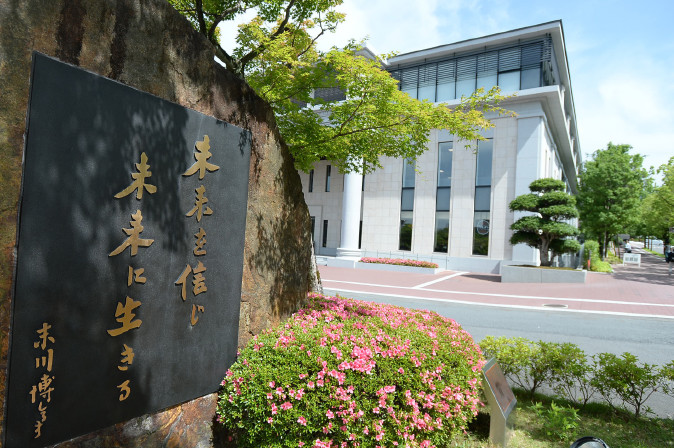Chapter III
Tuition Policies for AY 2020 and AY 2021
1.Discussion of Tuition Policies at the AY 2018 Plenary Council
Discussion of tuition policies at the AY 2018 Plenary Council addressed two major social challenges: 1) the tightening of enrollment quota management by the education ministry (MEXT), and 2) the government’s so-called “work style reforms.” In the context of Japan’s low level of public expenditure on higher education in international comparative terms and the gap between government expenditure on national and private institutions, the financial structure of private universities, including RU, is dependent on student fees for around 75% of revenue, while personnel costs account for around 50% of expenditure. Responding to the tightening of enrollment quota management and work style reforms is an important part of the social responsibility of the university and the Ritsumeikan Trust as a whole, and it is also a crucial task in terms of financial management, as it impacts both student fee revenue and personnel costs.
Even in the face of the challenges arising from the above changes in the external environment, we proposed 3) the advancement of academic reforms and student support through co-creation (learning innovation) in the period from AY 2019 to 2022.
Taking into account the burden of tuition on students and the major impact that the above challenges will have on university management and financial affairs, we decided to pursue continued discussions of these challenges, and formulate undergraduate tuition policies for AY 2020 and beyond on the basis of those discussions. For the graduate schools, the AY 2018 Plenary Council set the tuition policy to apply up to AY 2020, so we also decided to consider whether or not to align graduate school policy with the undergraduate tuition policy cycle thereafter.
2.Tuition Policies for AY 2020 and 2021
(1)Progress of discussion on the three issues carried over from the AY 2018 tuition policy discussions
1)Responding to the tightening of enrollment quota management
Financial management under the R2020 plan involves revising basic expenditure and revenue estimates to reflect actual budget and settlement conditions each year, and reviewing financial management indicators such as the revenue/expenditure balance. Enrolment numbers are an important precondition to formulating expenditure and revenue estimates, and we have confirmed in planning for AY 2019 admissions that the fundamental principle will be to achieve numbers consistent with our official enrolment quotas.
Basic expenditure and revenue estimates based on this principle showed that the revenue/expenditure balance for the Ritsumeikan Trust as a whole would remain almost event for AY 2019 and beyond.
However, as a result of the stricter management of enrollment quotas by MEXT and resultant changes in universities’ and students’ patterns of enrollment, the actual number of enrollees has fallen under quota. We need to continue striving to achieve appropriate enrollment management while also keeping in mind the upcoming university entrance exam reforms.
2)Responding to reform of social systems (work style reforms)
Education and research activities at RU are supported and implemented by faculty and staff in a variety of job types. To enrich students’ learning and growth, together with improvements to campus infrastructure and academic systems, we need to make our university a more attractive and inspiring place to teach and work for all of the diverse types of faculty and staff that are part of it.
A committee established under the Executive Board of Trustees has been looking into ways to respond to social system reforms. As its most urgent tasks, the committee has working to clarify issues related to securing fair work conditions (equal work for equal pay), and discussing the need for “Ritsumeikan work style reforms” for implementation around AY 2022. Based on these matters examined in AY 2018, discussions on specific measures will continue into the future.
3)Promoting co-creation policies (learning innovation)
As stated in Chapter II, budget for the co-creation policy in AY 2019 and 2020 has been secured through re-allocation of existing budgetary resources, and various co-creation initiatives are already underway.
The Counci l for the Advancement of Co-Creation Policy is now taking the lead in initiating discussion of initiatives for the second phase of the co-creation policy in AY 2021 and 2022. This discussion will be pursued in parallel with discussions on academic affairs in the AY 2019 Plenary Council and the formulation of the R2030 Grand Design.
(2)Tuition policies for AY 2020 and 2021
Discussion on the three issues carried over from the AY 2018 Plenary Council is progressing, but as noted above, we are not currently in a position to decide on specific programs or financial commitments.
Going forward we will be giving thorough consideration to matters such as academic policies, which originally should be a precondition for determining tuition policies, along with the “Ritsumeikan work style reforms” planned for AY 2022 and thereafter.
The AY 2019 Plenary Council will involve sharing and exchanging opinions on the processes and approaches to addressing academic issues, and provide a starting point for advancement to the next stage of discussion on academic policies and tuition policies, with an eye to the Plenary Council scheduled for AY 2021 – which will also mark the initial year of R2030.
In regard to graduate school reforms associated with graduate school tuition policy, we have been working to achieve enrollment quotas as part of the academic initiatives noted in Chapter 2, and are now maintaining enrollment at a reasonable level. From AY 2019, we will also be expanding and establishing a number of career path development support schemes.
Taking into account these conditions, we have determined to keep base tuition at its current level and continue using the current tuition revision formula until AY 2021. Tuition levels will not be revised in this period in response to the three challenges noted above.
In addition, we will reduce admission fees, in light of the fact that our admission fees are now higher than those at many other universities, which have successively reduced their admission fees in recent years. At the same time, in principle we will abolish the special reduction for new students that is currently applied to first-year undergraduate tuition. This move is designed to address the financial impact of the admission fee reduction, as well as being consistent with the fact that the special reduction for new students was originally instituted to compensate for increases in admission fee levels.
Admission fee
In recent years, other universities have moved to reduce their admission fees with a view to further globalization in the future. Taking into account this trend and the current admission fee levels at other universities, the admission fee for new undergraduate and graduate enrollees in AY 2020 and thereafter will be reduced from 300,000 yen to 200,000 yen.
Tuition revision formulas for new enrollees in AY 2020 and 2021
*For the College of Global Liberal Arts, tuition will be determined as it is currently, in accordance with the agreement with the Australian National University.
Undergraduate colleges and graduate schools (Master’s programs, years 1 and 2 of integrated doctoral programs, professional graduate degree programs)
For students entering both undergraduate and graduate programs up to AY 2021, the current base tuition levels will be maintained, and the current tuition revision formulas (i.e.the undergraduate formula up to AY 2019 and the graduate formula up to AY2020) will continue to apply.
In conjunction with the admission fee reduction, we will abolish the special reduction for new students, which is currently applied to first-year tuition (a reduction of 160,000 yen in base tuition for all colleges other than the Department of Pharmacy in the College of Pharmaceutical Sciences, where the reduction is 210,000 yen). The only department where the reduction will not be completely abolished is the Department of Pharmacy in the College of Pharmaceutical Sciences, where it will be continued to the value of 50,000 yen.
These changes will result in an increase in the overall payments for undergraduate enrollees (overall total of admission fee + tuition), but the changes, both to the admission fee and to the special reduction, have been determined in light of the number and composition of the new student cohort, with a view to maintaining current financial (revenue) structure (i.e., on the basis that they will not result in a drop in revenue or a deterioration of academic conditions, or result in an increase in revenue).
Tuition for AY 2020 enrollees will be as shown in the attached table, which is calculated in accordance with the consumer price index increase (1.4%) for the most recent fiscal year (2018).
Tuition revision formula for enrollees in AY 2020 and 2021
Tuition for new academic year = Base tuition × (1 + rise in consumer price index)
- Base tuition = annual tuition for AY 2018 enrollees, excluding the special reduction for new students
- Rise in consumer price index = fractional increase in consumer price index (national combined) in immediately preceding academic year as against average in AY 2015. Not to be applied if rise is less than 0.01.
- In the event that the tuition for the new academic year calculated using the formula is lower than the previous year’s tuition, an amount equal to the previous year’s tuition shall be used.
- Tuition for the new academic year calculated as above shall be halved (and rounded to the nearest 100 yen) to determine the per-semester tuition to be applied to enrollees in the said year.
- Base tuition for the Graduate School of Business Administration shall be credit-based tuition (tuition per credit x 23 credits) + fixed tuition (spring semester + fall semester). The per-credit tuition amount shall be 48,000 yen, with any increase in tuition pursuant to the formula added to the fixed tuition amount.
Graduate schools (Doctoral programs, four-year doctoral programs, 3 year and above of integrated doctoral programs)
The current tuition (250,000 yen per semester) will be maintained for enrollees in graduate school doctoral programs, etc. up to AY 2021.
Tuition amounts for entire period of enrollment
We will continue the current practice of clearly communicating to enrolling students the amount of tuition payable for their entire period of enrollment.
However, in the event that social factors cause a sudden and major rise in consumer prices that necessitates a re-formulation of tuition levels, we may propose revised tuition fees as an emergency measure.
Tuition applying to enrollees in AY 2019 and prior
AY 2020 tuition for students enrolled in AY 2019 and prior will be as stated at the time of enrollment (no change).
Financial Management Challenges toward R2030
We will take a thoroughgoing approach to financial management in areas other than tuition policy, taking into account the burden of tuition on students and the content of current and future tuition policies, and focusing mainly on the management challenges listed below.
These challenges are all identified as part of the financial management agenda for the second half of the R2020 period, and we will continue to make progress on them as we discuss and formulate the R2030 challenge design and R2030 basic financial management policy.
- Appropr iate management of enrollment numbers (official quotas)
- Review of expenditure budgets based on project evaluation (early full-scale implementation of PDCA cycle)
- Strengthening of donation programs (structural strengthening), etc.
Contents
- Chapter I.Significance of and Preparations for the AY 2019 Plenary Council
- Chapter II. Progress of Discussions to Date and Future Directions
- Chapter III. Tuition Policies for AY 2020 and AY 2021
- Document



